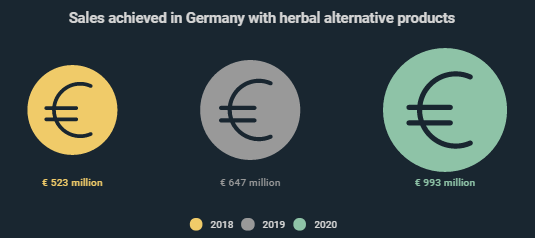Last year, Germany was responsible for €993 million in sales of plant-based alternative products such as oat milk or soy cheese. As recently as 2018, this figure was just €523 million, representing an increase of 89.9%, as shown in a new infographic from Kryptoszene.de.
While this shift towards vegan nutrition is by no means an exclusively German phenomenon, it has been particularly pronounced in the Federal Republic. Germany takes first place in two respects: in absolute sales of vegan substitute products, and also in relative sales growth in this field, according to studies conducted by the Smart Protein Project.
A look at the Rügenwalder Mühle Group demonstrates that companies can also benefit from this trend. The food manufacturer began offering a meat-free product line in 2014, and has since smashed record after record. The company, founded in 1834, now looks back on extremely successful years for business, not least thanks to this vegan trend.
Stock Market Hype
As many as 70% of German 18-35 year-olds are interested in a vegan diet. Yet plant-based nutrition is also popular across all age groups: according to a survey by „Kantar“, reported by „Merkur“, the interest among men – contrary to all clichés – is even more pronounced, with 58% interested in vegan diets.
The trend is also making itself felt on the stock exchange floor. While some producers have recently had to accept losses in terms of market capitalisation, investments with longer term perspectives have been generously rewarded. The price of Beyond Meat shares, for example, has risen by 353.8% over the past three years. Tofutti Brands‘ shares have increased in value by 52.8%. The DAX gained a mere 13.7% over the same period.
Folgen Sie uns auf Google News









